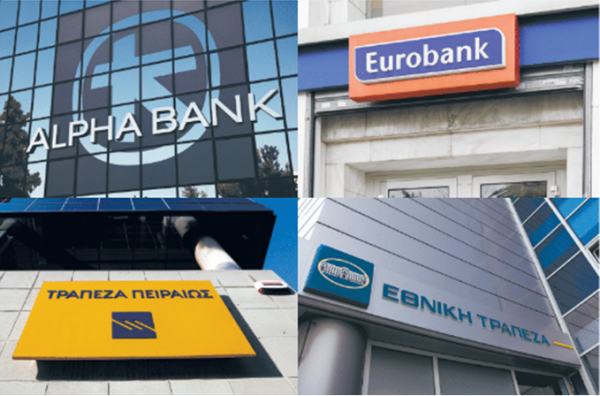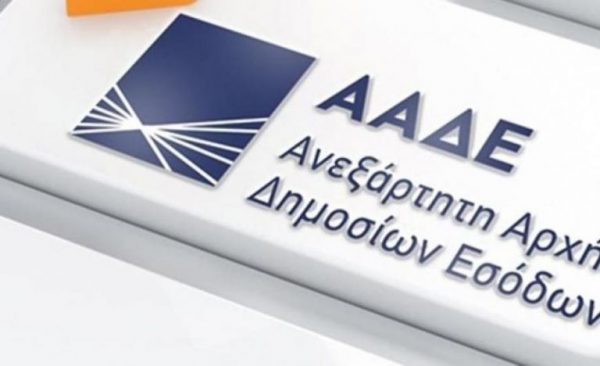
The process of finding solutions for debtors who have difficulty servicing their debt is becoming easier and more transparent, through a new electronic platform that was put into operation yesterday.
It is an online application through which, in a structured way, borrowers come into direct contact with their bank, to consider relief solutions, based on the revised Bank Code of Conduct.
Through it, both natural and legal persons can arrange their loans at bilateral levels, by submitting the relevant application online.
According to Theoni Alambasis, General Secretary of the Financial Sector, this development is very important for borrowers, as:
– It also concerns very small debts for which, due to the amount, an application cannot be made to the extrajudicial mechanism
– The submission of an application is simplified for the benefit of the citizen, as all the required documents are retrieved electronically
– The structured conduct of the prescribed procedures is ensured in order to provide the most appropriate solution
– The transparency of the process and the easier exercise of supervision by the Bank of Greece are enhanced
– The borrower who may be characterized as “uncooperative” is immediately informed, so that he can submit an objection
– It is possible to provide one or more solutions depending on the characteristics of the loan and the financial details of the debtor
The code of ethics
It is noted that the Code of Ethics is a statutory framework for out-of-court resolution for loans that were not reported before 01.01.2015.
With it, the general principles of behavior are established and best practices are adopted, which aim to strengthen the climate of trust, the mutual commitment and the exchange of the necessary information between the borrower and the institution.
In this way each side is able to weigh the benefits or consequences of alternative service solutions (settlement solutions) or final settlement (final settlement solutions).
Special care is also taken for micro-enterprises, for socially vulnerable groups and for cases of loans with multiple creditors.
The aim is for it to be the first step before a case ends up in the courts, by exhausting all the margins to find a mutually demonstrable solution.
The solutions offered
The solutions provided by the Code of Conduct can be temporary or permanent.
Loan settlement means a debt settlement solution that may include, for example, the extension of the loan repayment period, a reduced payment installment, the temporary payment of interest only, the separation of the debt, the deletion of part of the total claim.
To determine it, the available incomes are examined (i.e. income minus (-) reasonable living expenses), as well as the property of the borrower as well as those related to him, e.g. spouse, dependent adult members and the property of his co-debtors and guarantors.
The limits of reasonable living expenses, i.e. acceptable family expenses, have been determined by Hellenic Statistical Authority-ELSTAT and are increased in special / extraordinary cases (e.g. illness, disability, etc.). 
The types of solutions offered are predefined, while it is possible to combine restructuring proposals. These are the following:
– Types of short-term arrangements
As short-term types of arrangements are considered the types of arrangement with a duration of up to two years that relate to cases where repayment difficulties are considered, on good grounds, to be temporary.
(a) Capitalization of Overdue Debts: The capitalization of overdue debts and the readjustment of the repayment schedule of the outstanding balance.
(b) Overdue Debt Settlement : Agreement to repay overdue debts with a predetermined schedule.
(c) Reduced Installment Greater Than Interest Due : Reduction of interest-free installment repayment to a level exceeding that corresponding to an interest-only repayment for a specified short-term period.
(d) Payment of Interest only : During specified short term period only interest is paid.
(e) Reduced Installment Less Than Interest Due: Reduction of interest-free installment repayment to a level less than that corresponding to an interest-only repayment for a specified short-term period. Outstanding interest is capitalized or settled.
(f) Grace Period : Suspension of payments for a predetermined period. Interest is capitalized or settled.
– Types of long-term settings
The types of arrangement with a duration of more than 2 years are classified, with the aim of reducing the amortization installment and/or the loan burden, taking into account conservative assumptions about the estimated future repayment capacity of the borrower until the end of the repayment schedule.
It can include the following:
(a) Interest Rate Reduction : Reduction of the interest rate or the interest margin.
(b) Duration Extension : Extending the repayment duration of the loan (ie postponing the contractual date of payment of the last installment of the loan for more than two years).
(c) Separation of Debt: Separation of the borrower’s debt into two parts:
i) the portion of the loan which the borrower is estimated to be able to repay, based on his current and estimated future ability to repay, and
ii) the remaining part of the loan, which is settled later, by liquidation of property or other type of arrangement, which is agreed upon in principle by the two parties.
(d) Partial Debt Cancellation: Definitive cancellation of part of the institution’s total claim, so that the remaining debt is formed at an amount that is estimated to be able to be serviced smoothly.
(e) Operational Business Restructuring: Reorganization of the business, so that it becomes viable and capable of properly servicing its debts. Reorganization may include actions such as a change of management, sale of assets, cost containment, corporate transformation, renewal of credit lines and/or provision of new loans.
(f) Debt-to-Equity Swap Agreement: Conversion of part of the debt into equity, so that the remaining debt is formed at an amount that is estimated to be able to be serviced smoothly.
– Final Settlement Solutions
A final settlement solution is defined as any change in the type of contractual relationship between the institution and the borrower or its termination, with the aim of definitively settling the institution’s claim against the borrower.
This solution can be combined with a (voluntary) delivery to the institution of the things on which real security has been established in order to reduce the total amount of the claim or even with a voluntary sale of the things on which real security has been established to settle the claim.
The step-by-step process
According to the current institutional framework, the borrower as well as the guarantors of his debts must take the following steps to settle their debt:
– Step 1: Login to the Code of Ethics online platform and create an application (using taxisnet codes) to a single financial institution per application.
– Step 2: Carry out bank secrecy removal.
– Step 3: Extracting data and completing elements that are not already electronically registered.
The correct and complete completion of the application data (with a full record of all financial and other data, i.e. all income / income from all sources even future income as well as all expenses required for the living of all those living in the same house ), as well as the attachment of all required supporting documents, is an obligation and is for the benefit of the borrower.
This is a particularly critical point because any amount of money left over (after all the family’s expenses are covered) means that it will have to be given to the financial institution to repay the loans. 
In the case of a company or business activity, then all its financial data must be submitted as well as a business plan to document the income – expenses and the financial course of the business.
In case of incomplete completion of these details, then the financial institution may classify the borrower and guarantor in the category of non-cooperative borrower.
This means that he is not co-operating in providing the required information to determine whether he is indeed financially insolvent or a strategic defaulter. Such an undesirable development will make the position of the borrower difficult, as it will stop the process of joining the Code of Ethics.
To avoid such an unpleasant situation for the borrower, he should be cooperative. This means that all relevant information must be given to the financial institution without this translating into an obligation to accept everything the financial institution asks for, since several issues are a point of negotiation between creditor and borrower.
– Step 4: Submit a final application.
– Step 5: Evaluation of the application by the financial institution.
– Step 6: Each institution provides a proposal of one or more alternative settlement solutions and, if none of them are agreed upon, a final settlement solution.
– Step 7: Evaluation of the proposals by the borrower, who chooses whether to accept or reject it or whether to propose an alternative counterproposal within 15 working days.
If the applicant has chosen to make a counter-proposal, the Foundation must evaluate it within one month of its receipt and
(a) either consent to the counter-proposal
(b) either respond with “written communication” that he rejects it and that his original proposal remains active, with the underlying relevant documentation
(c) either submit a new proposal, which is final.
In any event, the bank should submit a final proposal indicating whether it includes acceptance of the applicant’s counterproposal, retention of the original proposal, or a new proposal in response to the applicant’s counterproposal.
Latest News

Economist: Greece Included in the Best Performing Economies in 2024
Meanwhile, Northern European countries disappoint, with sluggish performances from the United Kingdom and Germany.

EasyJet Expands Its Routes from Athens
The airline’s two new routes will be to London Luton and Alicante and they will commence in summer 2025.

Capital Link Forum Highlights Greece’s Economic Resurgence; Honors BoG Gov Stournaras
Capital Link Hellenic Leadership Award recipient, Bank of Greece Gov. Yannis Stournaras, an ex-FinMin, was lauded for his pivotal role during Greece’s economic recovery

Tourist Spending in Greece Up by 14%, Visa Card Analysis Shows
Greece’s capital Athens emerged as the most popular destination, recording a 17% increase in transactions with Visa cards, surpassing even the cosmopolitan island of Mykonos.

Inflation in Greece Unchanged at 2.4% in Nov. 2024
The general consumer price index (CPI) posted a 0.4% decrease in November compared to the previous month

2024 Christmas Holidays: Extended Shop Hours Schedule
The 2024 Christmas Holidays extended shop hours schedule commences on Thursday, December 12 and runs until the end of the year.

ELSTAT: Seasonally Adjusted Unemployment Down in October
The number of employed individuals reached 4,284,694, an increase of 67,723 compared to October 2023 (+1.6%) and 22,002 compared to September 2024 (+0.5%).

Greek PM’s Chief Economic Adviser Resigns
In the post on his Facebook page, Patelis did not disclose the reasons that led him to step down.

“Masdar Invests in the people of Greece and in the vision of TERNA ENERGY”
Four messages from the CEO of Masdar, the Arab renewable energy giant, after its acquisition of 70% of TERNA ENERGY

Lloyd’s List Greek Shipping Awards 2024: Honors for leading companies and personalities in the Greek shipping sector
20 awards presented at the 21st annual Lloyd's List Greek Shipping Awards


















![Χειμερινή εξοχική κατοικία: Οι Ελληνες γυρνούν την πλάτη παρά την πτώση των τιμών [γραφήματα]](https://www.ot.gr/wp-content/uploads/2024/12/Capture-19-90x90.jpg)























 Αριθμός Πιστοποίησης Μ.Η.Τ.232433
Αριθμός Πιστοποίησης Μ.Η.Τ.232433